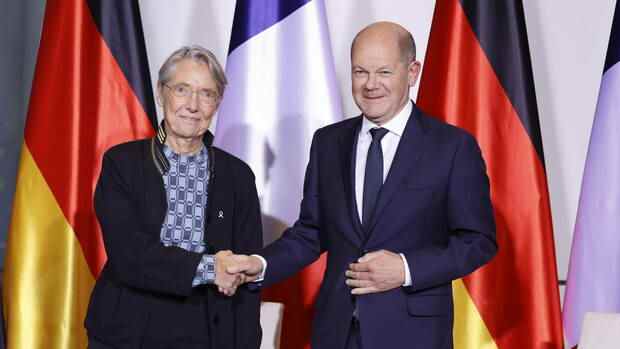Germany and France insist on a level playing field for European companies.
(Photo: IMAGO/Metodi Popov)
Paris The visit of French Prime Minister Élisabeth Borne to Chancellor Olaf Scholz (SPD) ended a week of intensive talks between the two governments. The Franco-German relations should get new impetus after the recent discord.
After their meeting on Friday in Berlin, Scholz and Borne highlighted the similarities – also in dealing with the controversial US industrial subsidies.
First of all, it is a good thing that US President Joe Biden wants to promote the green restructuring of the economy with the measures in the Inflation Reduction Act (IRA), said the Chancellor. “On the other hand, of course, we have to ensure fairness in the interaction between Europe and the United States.”
Borne stated that the “laudable ambitions to provide a response to the climate emergency must not lead to distortions of competition between Europe and the US”.
Top jobs of the day
Find the best jobs now and
be notified by email.
In addition to talks with Washington, the EU must also “strengthen its own instruments” to accelerate investments in the energy transition and a climate-neutral economy. “I think we share this view with the Chancellor,” said Borne.
>> Read also: Armor, technologies, raw materials – France and Germany repair their relationship
However, Berlin and Paris have different ideas about how strong the European reaction to the IRA should be. French President Emmanuel Macron is campaigning for a “Buy European Act” with subsidies for European manufacturers. The federal government is more cautious and hopes to be able to revive talks with Washington about a free trade agreement.
Berlin and Paris have different ideas about how strong the European reaction to the US subsidy package should be.
(Photo: dpa)
Biden’s legislative package includes $370 billion in spending to help domestic industry with carbon-neutral technologies. Protectionist passages such as the stipulation that a certain proportion of eligible electric cars must be produced in the USA set off alarm bells in the EU.
Macron: Violation of World Trade Organization rules
Macron, who is traveling to Washington next week, has criticized the package as violating World Trade Organization rules. Referring to trade barriers in the US and China, he recently said: “Europe must not be the only place in the world where there is no Buy European Act.”
France’s Economics and Finance Minister Bruno Le Maire, after a meeting with Federal Economics Minister Robert Habeck (Greens) in Paris on Tuesday, called for the EU to give a strong response to the IRA. “Europe must defend its interests”.
Habeck stressed the importance of a level playing field. The minister was open to state aid in the EU in response to the IRA. Above all, he pointed out that Europe must speed up its investments in green technologies, regardless of what the US does.
>> Read also: The USA is making the “biggest investment of all time” for the climate – and triggering fears in Europe
Finance Minister Christian Lindner (FDP) met Le Maire in Paris on Thursday. Afterwards, Lindner said that the IRA represents a “great challenge for the European economy”. It is important to seek dialogue and deepen transatlantic cooperation.
At an event organized by the “Süddeutsche Zeitung” recently, Scholz advocated “taking a very close look at the idea of a free trade agreement with the USA again”. Such an agreement is “always better than a bidding war on subsidies and protective tariffs, as some see coming as a result of the American Inflation Reduction Act.”
Europe must defend its interests. France’s Economy and Finance Minister Bruno Le Maire
The already tough talks about the transatlantic free trade agreement TTIP were put on hold after the election victory of former US President Donald Trump in 2016. They have not yet been resumed under Biden.
The government in Washington and the EU Commission have set up a working group on US industrial subsidies to defuse the dispute. In French government circles, it is acknowledged that they are not quite on the same wavelength as Germany when it comes to dealing with the IRA.
On the other hand, some in the federal government see the different tone of voice in Berlin and Paris as a strategic advantage for the ongoing talks with Washington: In a “good cop, bad cop” manner, Europe can make the possible consequences clear to the Americans, but also lend a hand expand trade cooperation.
More: Comment: The talks offensive between Berlin and Paris was overdue
